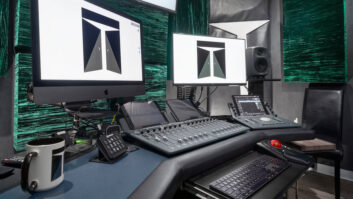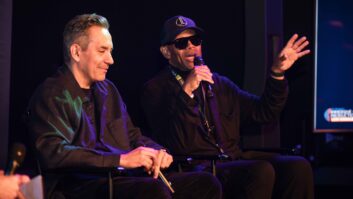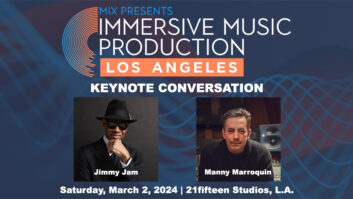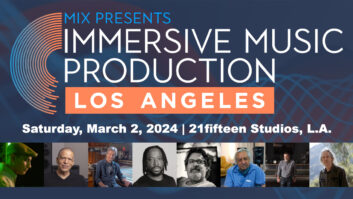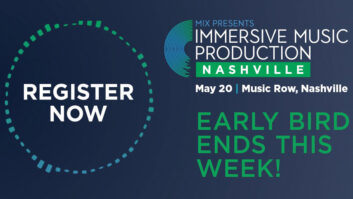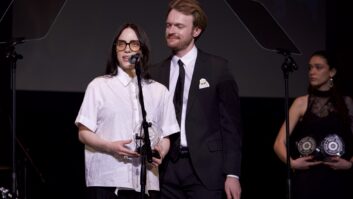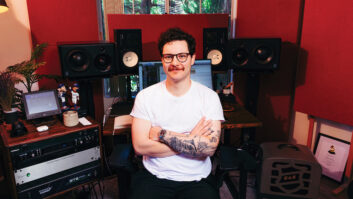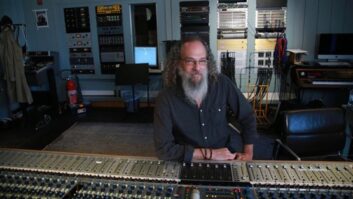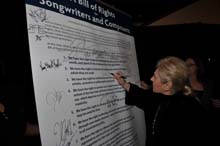
ASCAP President and Chairman of the Board Marilyn Bergman signs the special display version of ASCAP’s Bill of Rights for Songwriters and Composers.
‘Music Copyright in the Digital Age’ Addresses Growing Confusion, Debates
Thanks to today’s Web technology and networking capabilities, professional songwriters, lyricists and composers are facing a double-edged sword that’s becoming ever sharper. The growing ease and convenience with which musical content can be uploaded, shared, distributed, showcased and consumed worldwide is simultaneously posing a growing threat to the rights and livelihoods of those who create the music in the first place. Recent advances in communication and consumer technologies have not only challenged and altered the music industry’s longstanding big-record-label model, they are also creating further confusion over creative rights and ownership, and spurring new debates over defining the boundaries for legally using and sharing copyrighted material in the public domain.
In March, the American Society of Composers, Authors and Publishers (ASCAP) addressed these complex but vitally important and urgent issues head-on in with its Music Copyright in the Digital Age, a position paper that’s clearly written for a broad audience, along with A Bill of Rights for Songwriters and Composers in which 10 core principals “clarify the entitlements that every music creator enjoys.” (For more on this, click here.)
ASCAP unveiled its Bill of Rights in April at its “I Create Music” expo in Los Angeles with a special display banner that was signed by a number of celebrities and high-profile members of the music community, including Lionel Richie, Stacy “Fergie” Ferguson, Justin Timberlake, Quincy Jones, Desmond Child, Jackson Browne and many others. The organization also announced that it had collected more than 6,000 online signatures by early May (and is now “approaching 10,000” signatures) and continues to collect signatures.
ASCAP’s Board of Directors and its membership felt that now is the time for the PRO to re-examine and demystify what copyright protections mean to its constituents, businesses and consumers—in short, anyone who uses music.
“Wherever you look, copyright is criticized and attacked,” says Phil Crosland, ASCAP’s executive VP/CMO. “When you tear everything else away—all of the business aspects—it’s really copyright that sustains the livelihood of particularly songwriters and composers. Those are the people we represent. We saw this mounting pressure and realized that no one had ever undertaken a statement of what copyright really means to what we define as music creators. When we say ‘music creators,’ we’re largely referring to those people that start with a blank screen or a blank piece of paper—not the artist, necessarily, because artists represent a small percentage of our membership. It’s really songwriters and composers, and no one [organization] had really articulated copyright in a way that best represents them.”
Crosland strongly emphasizes that ASCAP is not seeking to establish new rights for songwriters and composers in response to digital distribution: “We’re not asking for new sources of revenue; what we’re asking for is a maintenance of copyright,” he says.
The 28-page position paper, which includes the Bill of Rights, is divided into four sections: the introduction, “Back to Basics: Defining a Right,” “Are Rights Still Relevant in the Digital Age?” and the conclusion. It also includes an addendum on public domain titled “Questioning the ‘Commons.’”
“We believe that education about [the non-profit organization] Creative Commons is important,” Crosland says. “There’s nothing wrong with Creative Commons when you understand all of its ramifications. But if you don’t understand it and you’re a music creator, you could get yourself in a position of giving something away that you’re going to deeply regret later on.”
Crosland sees this literature and its promotion as an important step toward obtaining “broad-scale support” for the rights of songwriters and composers with legislators in Washington, D.C.
Commenting on ASCAP’s undertaking of these initiatives and advocacy, Crosland says, “We believe that because we are directly owned and governed by our members—as opposed to third parties—that we have a more intense interest in serving the needs of our members. Our members are who I work for and the rest of the ASCAP staff works for, and that’s where you get the initiative, really, and the encouragement to do something like a position paper [and] a Bill of Rights.”
Music Copyright in the Digital Age can be downloaded as a PDF document for free from www.ascap.com/rights/ and the text for the Bill of Rights for Songwriters and Composers is available at www.ascap.com/rights/billtext.aspx.
Matt Gallagher is an assistant editor at Mix.
